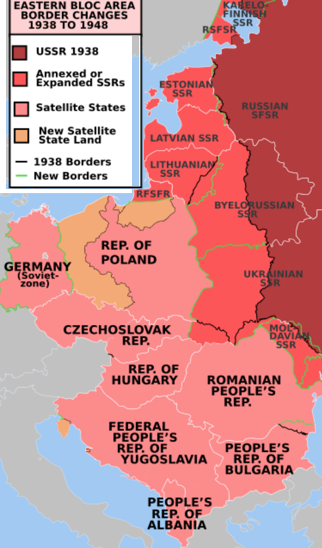- 1848 - Karl Marx, a German philosopher, economist, political theorist, sociologist, and Friedrich Engels wrote in the Communist Manifesto.
- 1887 - Vladimir Lenin developed Leninism—the adaptation of Marxism to the backward socio-economic and political conditions of Imperial Russia
- 1917 - Russian Revolution
- 1917 - Lennin is a leader in the October Revolution, in which the Bolsheviks overthrew the new regime. They changed their organization's name to the All-Russian Communist Party
- 1941 - Ho Chi Minh leads the Viet Minh independence movement against the French in Vietnam
- After the German surrender in World War II, Great Britain, the United States, France, and the Soviet Union divided Germany and Austria into four occupation zones, each to be administered by one of the victorious powers. The cities of Berlin and Vienna were similarly divided and occupied.
Even before the Germans surrendered, Soviet occupation troops assisted local Communists in installing Communist dictatorships in Romania and Bulgaria. Indigenous Communist movements established dictatorships in Yugoslavia and Albania in 1945. In 1949, the Soviet Union established the Communist German Democratic Republic in its occupation zone of Germany.
With the acquiescence of the western allies, the Soviets re-annexed eastern Poland, Bessarabia, and northern Bukovina. Though the Soviet Union also annexed the Baltic states (Estonia, Latvia and Lithuania), those annexations were never recognized by Britain or the United States.
- Korea was divided into two spheres of influence, North and South, along the 38th parallel when Japanese rule ended following WWII.
- 1945 - Communist-ruled Democratic Republic of Vietnam established
- 1950 1949 to 1994 Kim Il-sung leader of the Workers' Party of Korea authorized the invasion of South Korea in 1950
- 1950 Kim Il-sung leader of the Workers' Party of Korea (1949 to 1994) authorized the invasion of South Korea
- 1949 - Chinese Communists (Mao Zedong) defeat the Kuomintang (KMT) led by Chiang Kai-Shek. Chiang and his followers go to Taiwan.
- 1950-53 - Korean War
- 1956 Fidel Castro returns to Cuba to overthrow Juan Batista
- 1957 Che Guevara, Argentine Marxist revolutionary, physician, joins Fidel Castro
- 1964-73 - Vietnam War
- 1966 Mao initiated the Great Proletarian Cultural Revolution
- 1966 Guevara goes to Bolivia to help the revolution there
- 1970 Salvador Allende becomes president of Chile and adopts a policy of nationalization of industries and collectivisation
|

Source: Military occupations by the Soviet Union - Wikipedia
|
 Wars
Wars
 Spread of Communism
Spread of Communism Wars
Wars
 Spread of Communism
Spread of Communism